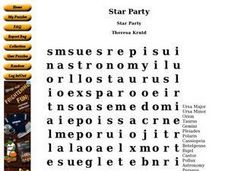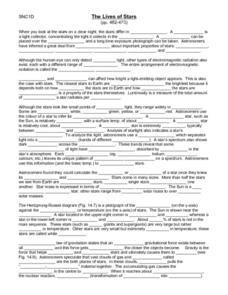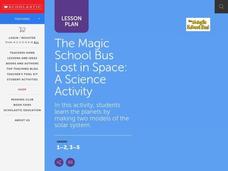Curated OER
Frames of Reference: The Basics
Learners learn the concept of frames of reference in physics. They examine how two frames of reference, each moving with respect to the other with a constant velocity v (constant speed, constant direction).
Curated OER
Airplane flight
High schoolers learn the basic concepts about airplane flight. They learn the reason jetliner wings are swept back and why jet engines have replaced propellers in high-speed flight.
Curated OER
Kepler's Second Law
Students explore orbital velocities and how they vary along each orbit, according to Kepler's Second Law.
Curated OER
Best of the Solar System
Students visit a site which provides images to be analyzed. Notes are taken and planets are named based on observed features and observations. Using peer review, they try to determine the identity of the planets. They are free to browse...
Curated OER
Day and Night
Students using experiments try to demonstrate how observations can be affected by the cycles of night and day.
Curated OER
Paint By The Numbers
Students, in groups, explore how astronomical spacecraft and computers create images of objects in space.
Curated OER
Please Ex-Planet
Seventh graders create a model of an earth centered solar system and a model of the sun centered solar system. As a class, they discuss why the earlier astronomers believed their model and why it changed when evidence arose that this...
Curated OER
Star Party
In this space worksheet, students identify and locate vocabulary terms related to the stars and space. There are 15 words located in the puzzle.
Curated OER
Reasons for Seasons
Students model the tilt of the Earth as it orbits the Sun. They explain the meaning and characteristics of solstices and equinoxes. They explain that sunlight hits the Earth at different angles at different locations over the course of...
Curated OER
Our Solar System
In this solar system worksheet, students complete a database comparing the 9 different planets' mass, surface temperature, rotation period, orbital period, moons, and distinguishing features. This worksheet is a graphic organizer.
Curated OER
The Solar System
High schoolers construct a sketch of the planets in our solar system using concentric circles and angles. In this solar system lesson plan, students plot the position of each planet on concentric circles using graph paper. The sun is...
Curated OER
Lunar Cycles
Eighth graders conduct internet research on a specific website to collect information about Lunar Cycles.
Curated OER
The Lives of Stars
In this stars learning exercise, learners review what makes up a star, how astronomers learn about stars, and the different types of stars including low mass and high mass stars. This learning exercise has 62 fill in the blank statements.
Curated OER
Habitable Zones
Students focus on stellar luminosities to estimate size of habitable zones, map out habitable zone around hot light bulbs that serve as models of stars, investigate how size of model "habitable zone" around light bulbs depends on...
Curated OER
How Do We Explore Strange Environments?
Young scholars identify and label the different parts of a robot, rover, or a spacecraft. They discuss and record all of the features their robot will need to accomplish its mission and be able to explain why they chose these features...
Curated OER
My Hometown
Learners identify the basic requirements needed for survival and identify the resouces needed for survival that are found within their own community. They use craft materials to create a model of it and then. create a color key to...
Curated OER
The Magic School Bus Lost in Space
Young scholars learn along with Ms. Frizzle's class. In this Magic School Bus lesson plan, students explore outer space as they visit the Sun, Mercury, Venus, and Mars in order to learn about our solar system.
Curated OER
The Magic School Bus Out of This World
Students learn along with Ms. Frizzle's class. In this Magic School Bus lesson plan, students explore craters that objects of different sizes and weights (marbles, Ping-Pong balls, and aluminum foil balls) create.
Curated OER
The Sun
Middle schoolers draw diagram of sun and its layers, including photosphere, chromosphere, corona, convection and radiative zones, and core. Students then describe each layer in their own words, define sun spot cycle, and describe solar...
Curated OER
Sweet Candy Comets
Fourth graders use candy to make a comet. In this lesson, 4th graders examine the role comets have played throughout history, students watch NASA videos about comets and complete the lesson by making an edible model of a comet. This...
Curated OER
What are Stars?
Young scholars research the solar system and it's characteristics. For this solar system lesson, students are broken into 4 groups, each assigned a specific part of the solar system. Young scholars use the Internet to research their...
Curated OER
Exploring Space Fact
Learners visit web sites to gather information about space and space exploration.
Curated OER
Follow the Sun
Students use a simple model of the Earth and Sun as seen from space to explore the sun's apparent movement across the sky over the course of a day and year. They consider the apparent direction of movement and changes in the sun's angle.
Curated OER
MASS
Students distinguish between weight and mass. They examine how in oscillations of a mass against an elastic spring--in the absence of gravity, or in horizontal motion--the length of the oscillation period is proportional to the square...
Other popular searches
- Astronomy and Space Science
- Space Science Astronomy
- Science Astronomy Stars
- Earth Science Astronomy
- Science Astronomy Graphing
- Life Science Astronomy
- "Astronomy and Space Science

























